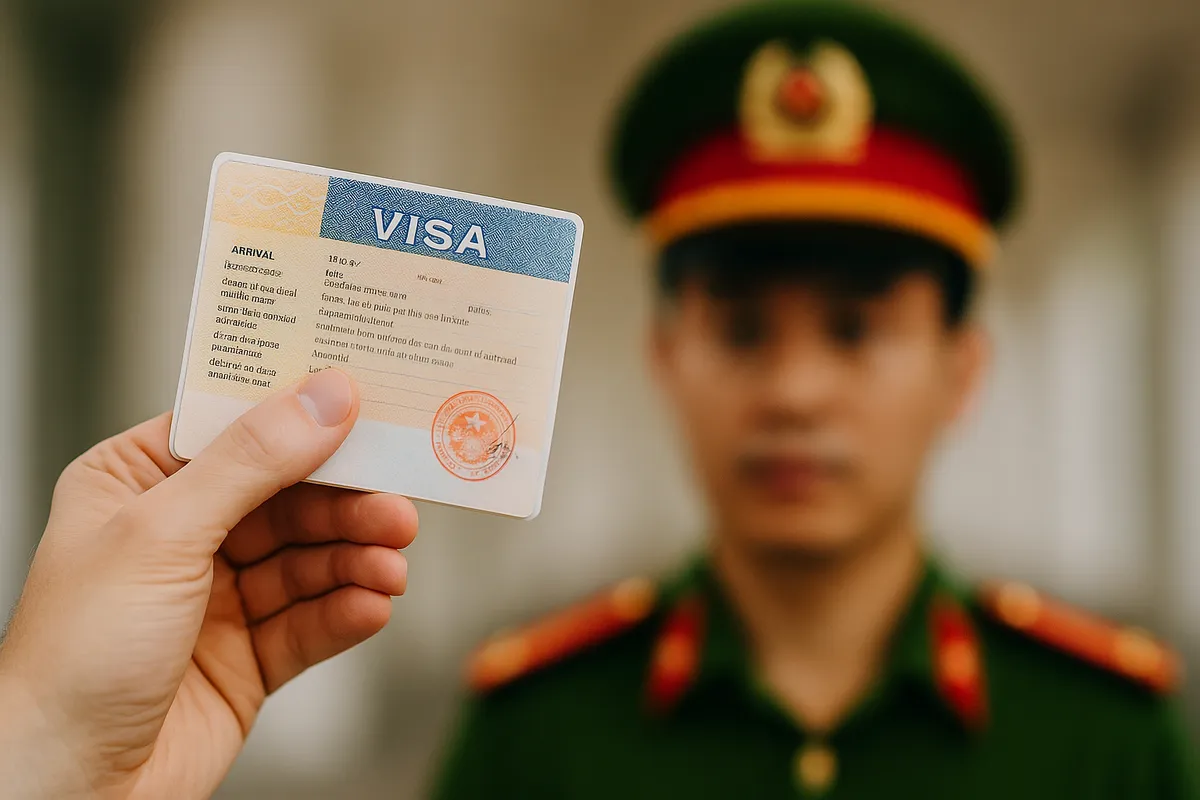Vietnam Deports Foreign Tourist for Altering Visa Validity
- Sunday, Jun 15, 2025, 10:58 (GMT+7)
Vietnam Deports Foreign Tourist for Altering Visa Validity
A Slovak citizen has been deported from Vietnam after being discovered falsifying the validity period on his electronic visa in an attempt to extend his stay. According to the Hanoi Immigration Department’s official announcement on 13 June 2025, the 39-year-old man entered Vietnam using an e-visa valid from 22 March to 31 March 2025. However, on 25 April, while staying at a hotel in Hoan Kiem District, he was found carrying a printed e-visa with a manipulated date. Authorities confirmed that he had deliberately altered the visa’s expiration date, violating Vietnam’s immigration regulations. The tourist was fined 8 million VND and deported from the country.
Tampering with an official document, including electronic visas, constitutes a serious offense under Vietnamese law. The e-visa system operates through an online portal, issuing verifiable documents with a QR code and official validation. Any attempt to modify printed information invalidates the document and is considered a form of administrative fraud. In this case, the alteration of the visa’s validity was regarded as a deliberate act of misrepresentation with potential consequences for national security and immigration management.
Vietnam’s e-visa system currently serves citizens from more than 80 countries and territories. It is a key tool for promoting inbound tourism and simplifying entry procedures. Between January and May 2025, Vietnam welcomed over 7 million international arrivals, the majority of whom entered using e-visas. While the system enhances convenience for travelers, it also increases the demand for strict oversight. The recent incident serves as a cautionary tale for those who might attempt to exploit perceived technical loopholes and reinforces Vietnam’s commitment to maintaining a transparent and secure immigration environment.
International travel forums have recorded cases of tourists mistakenly entering incorrect dates or personal information when applying for e-visas. Most of these cases are resolved by submitting new applications or contacting visa support. However, deliberately altering printed visa information is rare and typically results in immediate deportation or entry bans. In many countries, such offenses may carry long-term penalties including travel restrictions lasting from one to five years depending on the severity and local legislation.
From an administrative perspective, the case exposes a gap in the capacity of accommodation providers to verify visa authenticity. Under Vietnamese law, hotels, homestays, and short-term rentals are required to report foreign guest stays and ensure the validity of their travel documents. Yet, many establishments lack access to digital tools that can confirm e-visa data. In this case, the violation was detected during an administrative inspection by immigration officers. Without such intervention, the tourist could have continued to stay illegally without immediate detection.
For international travelers, especially younger tourists who often book accommodations and plan trips online, the lack of awareness regarding the legal status of visas poses a considerable risk. Many travelers mistakenly believe that e-visas are flexible digital documents that can be modified. In reality, even a minor alteration such as changing a single date constitutes document falsification. In addition to immediate deportation, such behavior can negatively affect a person’s future travel history and complicate visa applications for other countries.
Preventing similar incidents requires more than stricter visa issuance processes. Instead, the focus should be on communication, verification, and the use of modern technology. Immigration authorities could introduce QR code scanning tools for accommodation providers to verify e-visa information against official records. Hotels and rentals should receive clear training and guidelines on how to detect suspicious alterations such as mismatched fonts, inconsistent data, or irregular formatting. Additionally, a hotline and fast-response protocol should be established for handling suspected cases promptly.
It is important to emphasize that acts of fraud impact not only the individual involved but also a country’s image. Vietnam is striving to present itself as a welcoming and safe destination while maintaining a firm stance against unlawful conduct. An incident that might seem minor such as adjusting a visa date can lead to significant consequences when it violates immigration rules. By publicizing this case, authorities aim to raise awareness and demonstrate the country’s commitment to lawful and transparent tourism practices.
Failure to enforce such regulations may invite repeated offenses and set a dangerous precedent. Individuals with malicious intent could exploit procedural weaknesses and pose broader threats to social stability and public order. Imposing fines and deportation in this case is not only a response to a single violation but a strategic step to uphold Vietnam’s integrity in managing foreign entry.
Travelers may be tempted to alter visa documents to extend their holidays, avoid renewal fees, or due to misunderstandings. Regardless of the motive, the outcome remains clear: fines, deportation, and possible entry bans. Tourists must protect themselves by understanding local laws, strictly adhering to visa conditions, and avoiding any form of document tampering. Accommodation providers need to enhance document screening processes and the immigration system must continue evolving to balance accessibility with enforcement.
Vietnam is expanding its reach in the global tourism market through progressive policies with the e-visa system at its core. However, this openness must be accompanied by strong regulatory controls to protect national interests, ensure fairness for law-abiding visitors, and preserve Vietnam’s reputation as a responsible host country. The incident in Hanoi is a reminder that transparency and rule enforcement are essential components of sustainable tourism development in the post-pandemic era.

 CHECKIN.VN
CHECKIN.VN








Share on